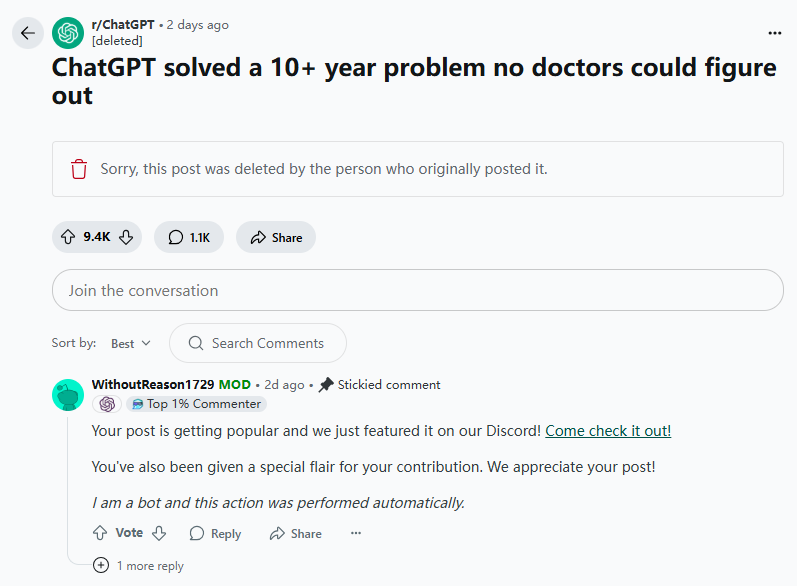In recent years, an increasing number of people have begun to rely on artificial intelligence (AI) to solve medical challenges, including rare diseases that some specialists have failed to detect. Recently, a user shared on Reddit their experience of using ChatGPT to identify a long-overlooked MTHFR gene mutation that had been ignored by doctors for over a decade. This mutation exists in 7 to 12 percent of the population. After years of MRIs, CT scans, blood tests, and neurological exams, the user's symptoms remained a mystery until ChatGPT provided this clue.

The user input their lab results, symptom descriptions, and medical history into ChatGPT, which pointed out that even if vitamin B12 levels were normal, an MTHFR mutation could still cause poor nutrient absorption, a problem that could be addressed with targeted supplements. A few months later, the user's symptoms almost completely disappeared.
This user's experience sparked more similar stories. One user mentioned that after 15 years of recurring vomiting, ChatGPT suggested seeing an ear, nose, and throat specialist, and a subsequent brain scan revealed a balance disorder related to labyrinthitis and nerve compression, a treatable condition.
In the comments section, many people mentioned deep-seated issues within the healthcare system, such as time pressure, over-specialization, and the overwhelming workload of clinics, which often caused doctors to view symptoms in isolation. One user described each visit as like being on an "island," while ChatGPT can integrate information and provide unbiased analysis.
A medical student also pointed out that doctors usually prioritize finding the most likely explanation, often overlooking the possibility of rare diseases. Therefore, keeping up with the latest research is almost impossible for individual doctors, which is where AI has an advantage.
Although many users shared the help they received from ChatGPT, they still warned not to fully rely on AI. ChatGPT may still make mistakes, and many users emphasized that they would confirm AI's suggestions with a doctor.
AI cannot replace medical care, but it can help patients speak up for themselves and suggest new ideas to doctors. It is worth noting that users should be cautious when uploading medical documents to ChatGPT, and personal health information should not be entered into AI systems without proper processing to avoid violating data protection regulations.
Key Points:
🧬 ChatGPT helped a user identify a ten-year-old MTHFR gene mutation, improving their health.
👩⚕️ Time pressure and specialization in the healthcare system lead to many rare diseases being overlooked, while AI can integrate information and provide new ideas.
⚠️ Be cautious when handling personal health information when using AI, and ensure privacy and security.
